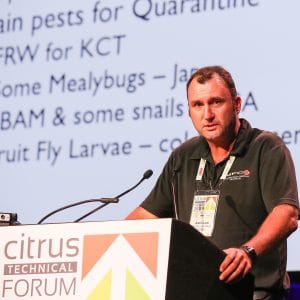14 May 2019
MFC works with growers on chemical use

MFC Grower Services Technical Manager, Justin Lane, at the Citrus Technical Forum in March.
MFC works with growers on chemical use
14 May 2019
Mildura Fruit Company has produced a pesticide strategy management book for its growers to help them manage integrated pest management (IPM) with a rational use of chemicals to protect available chemistry.
MFC Grower Services Technical Manager, Justin Lane, told the Citrus Technical Forum that proper management of chemicals us will help protect available chemistry for longer.
Justin said the book is market driven as MFC, like all packers, need to ensure all fruit meets MRL requirements for all available markets.
MFC has more than 140 growers of varying supply volume and exports about 80% of its fruit.
MFC has put a big focus on the KCT (Korea, China, Thailand) markets over the past 7-8 years and new chemistry for the KCT program includes Samurai (now registered for Fullers Rose Weevil, Citrus Gall Wasp, Red Scale and leafminer) and Exirel (foliar spray) (for Fullers Rose Weevil (suppression), Light Brown Apple Moth and Kellys Citrus Thrip).
Justin said the booklet and its approach helps it try to protect the longevity of these important chemicals with growers.
“Most chemistry eventually develops resistance so we try to rotate chemical groups to ensure longevity,” he said.
“Our pesticide strategy includes chemical options for target pests at specific timings – we understand ‘not one size fits all’.”
Justin said MFC has worked closely with chemical companies to rotate chemistry and protect longevity.
“We try to encourage growers to rotate their chemistry and not use a particular product or product group for more than two consecutive years or three at the most.
“Good products need to be protected. Products like Movento for Red Scale in our growing areas should be rotated out every few years.
“We encourage the use of Paraffinic oils and products like Wetcit where appropriate.”
Within the pest management strategy booklet, MFC have:
- Two different strategies for the KCT program
- Neonicotinoid (systemic soil applied insecticides and foliar applied) – two chemistry options
- Non-Neonicotinoid – five chemistry options
- One strategy for non-KCT growers with four chemistry options
“We try to help our growers as best we can with this book to understand chemistry groupings and rotating these to protect their longevity.
“An example of this is Samurai and Confidor Guard which are systemic insecticides with different active ingredients, however they are in the same family ‘Neonicotinoid’s’ which are Group 4A insecticides.
“Simply rotating from one of these products to the other will not help protect the longevity of this family or group of chemicals so an insecticide from another group will be needed.
“We try to simply give options to rotate to and protect the longevity of all of our available chemistry.”
Justin described the ban of Chlorpyrifos in the USA as a game changer and MFC’s growers will not be using it at all from next season. They will be updating their MFC Pesticide booklet to reflect this.
Justin said neonicotinoids are also receiving bad publicity in the UK.
“We’re not sure of the lifespan of these products being used on fruit going to these markets. Unfortunately, this is most likely limited.”
Justin said growers should always work closely with their packer to ensure their fruit will meet specific market requirements of their designated country.
MFC assesses spray diaries and declarations of all growers prior to each season and also encourages its growers to investigate and utilize IPM programs.
Membership
You are not logged in
If you are not already a member, please show your support and join Citrus Australia today. Collectively we can make big things happen.
